- Home
- Jason Webster
Violencia
Violencia Read online
BY THE SAME AUTHOR
NON-FICTION
Duende: A Journey in Search of Flamenco
Andalus: Unlocking the Secrets of Moorish Spain
¡Guerra!: Living in the Shadows of the Spanish Civil War
Sacred Sierra: A Year on a Spanish Mountain
The Spy with 29 Names: The Story of the Second World War’s Most
Audacious Double Agent
Spanish Ways: Exploration of an Enchanted Land
THE MAX CÁMARA NOVELS
Or the Bull Kills You
A Death in Valencia
The Anarchist Detective
Blood Med
A Body in Barcelona
Fatal Sunset
CONSTABLE
First published in Great Britain in 2019 by Constable
Copyright © Jason Webster, 2019
The moral right of the author has been asserted.
All rights reserved.
No part of this publication may be reproduced, stored in a retrieval system, or transmitted, in any form, or by any means, without the prior permission in writing of the publisher, nor be otherwise circulated in any form of binding or cover other than that in which it is published and without a similar condition including this condition being imposed on the subsequent purchaser.
A CIP catalogue record for this book is available from the British Library.
ISBN: 978-1-47212-982-6
Constable
An imprint of
Little, Brown Book Group
Carmelite House
50 Victoria Embankment
London EC4Y 0DZ
An Hachette UK Company
www.hachette.co.uk
www.littlebrown.co.uk
For Arturo and Gabi
‘The Spanish prefer war to resting, and if they have no enemy abroad, look for one at home.’
Pompeius Trogus (first century BC)
‘The Spanish have made great discoveries in the New World, yet still do not know their own continent: there are sections of her rivers which they have not explored, and in her mountains live nations which are unknown to them.’
Charles de Montesquieu
‘Perhaps no other country except Turkey is so little known and so ill judged by the rest of Europe as Spain.’
Karl Marx
‘Spain never changes.’
George Borrow, The Bible in Spain
CONTENTS
Author’s Note
Introduction
The Three Faces of St James
PART ONE
PRE-SPAIN
Geography
Peoples
Two Caves
Men from the East
ITALIAN SPAIN
Hispaniae – the Roman Spains
Priscillian
GERMAN SPAIN
Visigothic Spain
A Sevillian Saint
The Last Goth
PART TWO
ARABIAN SPAIN
Views of Moorish History
What’s in a Name?
Civil Conflict in Al-Andalus
A Song from the East
Death in Cordoba
Spanish Medicine
Rise and Fall
HEROIC SPAIN
Fitting In
Party Time
Moorish Views of Christians
Chivalry
Pilgimage and Moor-Slaying
Peoples of the Veil
A Desert Island Story
Straight Thinking
Crossover
PART THREE
1492
The Road to 1492
No Moor
No Jew
No Way
No Mistake
INTERLUDE
Scene One: The Inquisition
Scene Two: A Mixed Palate
PART FOUR
AUSTRIAN SPAIN
The Outsider
Human Rights
The Insider
Capital Cause
Worlds Beyond Worlds
Moors Out
Golden Years
FRENCH SPAIN
Spanish Succession
Boring Down
A New Fitna
Violent Constitution
A Fernando to End All Fernandos
Carlist Wars
A Second (Class) Isabella
Chaos
PART FIVE
BEFORE
The Road to a Second Republic
A Little Dictatorship
What’s in a Republic?
Second Time Around
About Turn
Prelude
DURING
No One’s Spain
Everyone’s Spain
AFTER
Post-war
Recovery and Decline
Transitions
Conclusion: The Last King of Spain
Acknowledgements
Index
AUTHOR’S NOTE
This book describes in part how a geographical reality has at times been turned into a political one. ‘Spain’ can refer to both. As this double meaning creates complications, for the sake of simplicity I often refer to the geographical Spain as ‘the Peninsula’ for short.
In a similar vein, Castilian Spanish spellings for cities and individuals are generally used, except where an English rendition is more common. Hence ‘Ferdinand’ is preferred in the case of the Catholic Monarch and husband of Queen Isabella, but the nineteenth-century king of the same name is referred to as ‘Fernando’. As the book is mostly focused on Spain, the Holy Roman Emperor Charles V goes under the Spanish version of his name, Carlos.
INTRODUCTION
Spain is a Cassandra, forever predicting the future of those around her; what happens there foreshadows events elsewhere.
But as with Homer’s doomed prophetess, Spain is rarely heard, for her prescient gifts are unrecognised. A more commonly held view is that, in most matters, Spain is generally behind her European neighbours (if in a Romantic kind of way).
Even a brief glance at Spanish history, however, bears out the fact that, on highly important issues, she is almost always in the lead: the Crusades, the European Renaissance, the Discovery of the Americas, Western imperialism, Liberalism, post-colonialism, the Second World War, the Cold War and the recent Occupy movement are all either driven by, presaged by, or built on, Spanish endeavour and experience. Without Spain, emblematic aspects of ‘Western’ civilisation as diverse as rational thought, modern surgery and the American cowboy would all be missing. Not only that: in a theoretically ‘Spain-less’ world, there is no desert-island story, no courtly or romantic love, no chivalry, no ‘modern’ literature or painting, no Animal Farm or 1984 and the warnings they still sound for contemporary society. On all kinds of levels – culturally, politically and socially – developments in Spain present powerful indications of the way things will go in the rest of Europe and the West.
Given this tendency, you might be forgiven for assuming that all eyes would be fixed on Madrid and Barcelona both for mapping out the past and for indications of what is to come. Yet this is very far from the case. In 1969, Kenneth Clark wrote this in the introduction to his Civilisation:
Some of the most offensive omissions were dictated by my title. If I had been talking about the history of art, it would not have been possible to leave out Spain; but when one asks what Spain has done to enlarge the human mind and pull mankind a few steps up the hill, the answer is less clear.
Extraordinarily, for Clark the Spanish had done nothing to advance ‘the European mind’, and so had no place in his magnum opus. Echoing a generally held view, the country had played little part in the history of ideas, so why look to it for the future?
As with Cassandra, so with Spain: the rest of the world
ignores her and carries on, convinced that their own particular Troy will never fall. Spain may be viewed as a pleasant tourist destination, as one of a handful of economically fragile Mediterranean countries propped up by the rest of the European Union, as a nation of passion, colour and fiesta – in all manner of ways – but it is seldom seen as pathfinder or harbinger, despite acting as a gauge of the winds of time over many hundreds of years.
The cause for this myopia lies as much with the Spanish themselves as with outsiders. As with most peoples, Spaniards are generally proud of their country’s achievements. But ask what those achievements are and many would struggle to recognise a large number of the examples given above. In fact, an average Spanish person is more likely to inform you that the (admittedly laudable) pastime of table football was invented by one of his compatriots, than that the scalpel, speculum and over two hundred other common surgical instruments were first devised by a Cordoban of the twelfth century. Or that a clunking long-distance train known as the Talgo was the fruit of Spanish industrial design, than that the concept of ‘human rights’ was first debated over four hundred years ago in Valladolid.
And this is because Spain is locked in perpetual civil conflict: every century in the country’s history has witnessed at least one major civil war, often several. In consequence, Spain periodically blinds herself to huge swathes of her own past in an attempt to forge new national identities. By drawing a veil over aspects of her history, pretending that they never happened or placing them in some sanitising parenthesis, she tries to create a positive out of a negative aimed at uniting a notoriously disunited people: If we are not that, then we must be this.
The most recent example of this collective act of forgetting came in the wake of the dictator Franco’s death in 1975. In what was actually called the ‘pact of forgetting’ or the ‘pact of silence’, the bloodshed and crimes of the previous decades were made to vanish in what was viewed as a pragmatic move to help pacify the many forces which might have brought down the nascent democratic state. ‘Don’t mention the war!’ became the unspoken watchword.
Another lasting and perhaps more serious example is found in how the Moorish period of Spanish history is viewed to this day. The orthodoxy is that the Moors are ‘Other’, are ‘them’, and that the ‘Spanish’ side of that particular chapter involves nothing more than the defeat and expulsion of the ‘invader’ (over the course of some eight hundred years, no less). That a thriving and highly advanced civilisation could exist in a country for almost a millennium and then be effectively wiped from the national story – by pretending that ‘we’ had nothing to do with it – is clearly absurd. And yet the reason why an average Spaniard can’t tell you that, to take our example, modern surgery was invented by one of his own, is because that man was a Muslim, spoke Arabic and went by the name of Al-Zahrawi. In the Spanish imagination he is, at a stroke, removed from the collective narrative as a ‘non-Spaniard’.
The trouble with not knowing your own history, however – or only having a partial grasp of it – is that you lay yourself open to the risk of repeating patterns of behaviour, many of which can be destructive. Expunging what doesn’t fit, or what is uncomfortable, only brings more problems in its wake. The ‘pact of forgetting’ which acted as midwife to the modern Spanish state may have seemed a good idea in its day, but the multiple and dangerous divisions within Spain now can largely be understood as a split between supporters and detractors of the nation constructed in the late 1970s. Many of the problems lie in the lack of honesty about how it was built and what preceded it. Pretending that the ghosts from the past don’t exist only makes them stronger in the long run.
This is the story that Spanish history consistently tells, of trying to remove unwanted truths from its past only to fall back into repeated patterns of behaviour. The tendency is so integral to the country’s experience that it is even embodied in its patron saint, St James – Santiago. As Islamic Iberian kingdoms were gradually conquered during the Middle Ages, a collective identity on the Christian side coalesced around ‘not being Moorish’. Hence Santiago’s nickname ‘Matamoros’, the Moor-Slayer, and his depiction astride a horse slicing off be-turbanned heads. For centuries Santiago provided a symbol around which the Christian Spanish peoples could find some kind of shared identity: ‘We are not them.’ But beyond being a warrior for Christ, Santiago doesn’t in turn supply much in the way of what being Spanish actually is. Because ‘Spanishness’ is a particularly slippery quality to define. And so the poor saint is frozen in his martial pose, forever fending off perceived threats to national unity. In consequence, the handful of ‘Moors’ at his feet turn into a form-changing Hydra, stubbornly growing new heads whenever any are cut off.
The role Santiago represents has been played many times over the course of Spanish history, often predating the saint’s iconographical metamorphosis from Apostle into bloodthirsty Knight. The Visigoths, the Almohad caliphs, Philip II, and Franco, all tried in some way to forge a Spain in their own image, and all, ultimately, failed. For the job of killing off the enemy is a perpetual and thankless task; Spain is a conglomeration of nations, witnessed by the fact that today, with a population of some forty million, it has five official languages (one of which, Basque, is not even Indo-European). In such circumstances national unity can at best be a work in progress, and threats against it can never be annihilated; in recent times it has risen again in the shape of Catalan separatism. Santiago would be better served by turning his sword towards himself and studying his own face reflected in its steel surface. Then he might understand that, in fact, there is no Other, only him, multifaceted, complex and endlessly fascinating.
Some of the greats of Spanish culture have at times performed this very act, placing a looking glass before their audience: Cervantes with his multi-layered depiction of the impoverished yet aristocratic hidalgo Don Quixote; Goya in the psychological and satirical acuity of his royal portraits, of which his sitters were (presumably) unaware; and most obviously Velázquez in his masterpiece, Las Meninas, by deliberately placing a mirror at its heart, reflecting the royal couple watching him work while he paints their daughter. In all of these, the invitation is to look at ourselves – and for the Spanish to look at themselves.
Yet despite these individual moments of clarity, the tendency (as elsewhere: the Spanish have no monopoly on this) is towards partial collective amnesia. If history is viewed at all, it is generally less in order to shed light on the present than to support one or other current world view or perspective. And this in turn condemns the country blindly to follow routes it has taken many times before; the details change, but the structure remains the same.
Part of the problem is that learning from past mistakes requires a certain humility. Yet if one Deadly Sin were to define the Spanish national character, it would be Pride. Anyone who has spent time in the country and with its people will know what I mean. Many examples could be given by way of illustration, but here is one taken almost at random:
At a party in France once I met a Swiss woman who ran a luxury car-valeting service in Berne.
‘I used to employ Spaniards,’ she told me, ‘but not any more.’
I asked her to explain.
‘They were too quick to take offence. If they felt a customer wasn’t treating them with enough respect they would simply refuse to clean his car.’
Images flashed through my mind of imperious Ferrari-driving bankers ordering valet boys around, and a secret sympathy for the put-down-upon Spaniards came with it. But the woman went on:
‘You can’t run a business like that. I only employ Portuguese now.’
Things in Spain are rarely what they seem. Black and white do not lie in binary opposition, but tend to coexist side by side in paradoxical union. How else can one explain that in a perpetually divided nation (which has no words to its national anthem because no one can agree what they should be) there are those who, with no sense of irony, use terms such as la España eterna – ‘eternal
Spain’ – as though it had been created by God Himself? The country’s geographical positioning goes a long way to explaining this curious state of affairs: seen from above, it becomes clear that Spain is a crossroads – between Europe and Africa, the Mediterranean and the Atlantic, between East and West, North and South.1 As such it is simultaneously all of these seemingly contradictory things, a springboard from one to the other, while also being essentially itself.
This mixing of so many elements over the centuries from so many different quarters has had the effect of turning Spain into a crucible, where multiple and apparently inharmonious ingredients have long been combined in alchemical experimentation. Sometimes gold is produced; at other times, base lead. And this contradiction explains the inner tensions which define the country: her influence – the product of her refining – spreads far beyond her borders, while she herself continues to bubble in agitation, caught between pulls to the dark and pulls to the light, both equally strong.
In a similarly paradoxical fashion, this book is both a history and not a history. History, to my mind, while fascinating in itself, best serves us when it functions as a tool in which understanding yesterday helps bring a better awareness of today and tomorrow. Spain’s story is told here from her very beginnings to the present day, and includes a liberal sprinkling of anecdote and personal observation. It is history viewed from a macro-perspective, one in which patterns emerge that might be invisible when focusing at a micro-level. As such there will inevitably be gaps, but it is my intention that the overall story of Spain’s past will shed light on the country’s current state and the choices facing it. And in consequence, the choices which will be facing other Western countries in the near future.
Spain has given me so much – my passion, interests, and my livelihood. Without Spain I would be much the poorer person, for it is the birthplace of both my wife and my two children. I have been enamoured of it since I was a teenager, when a chance glimpse of images of the Alhambra captivated me and subsequently shaped the course of my life, leading me to a degree in Arabic and Islamic History at Oxford, and from there to making Spain my home. This book is a distillation of much thinking, reading and writing about the country over the past thirty-five years, but most importantly of living there, absorbing the language and culture, and, as far as I am able, going ‘native’. It is in part a homage to the best of Spain, an indefinable yet instantly recognisable essence, a precious kernel which has held me spellbound my entire adult life. The Spain which enchants and enraptures; a powerhouse of art, beauty, wisdom and mystery; a crossroads for civilisations and a country which has given so much to the rest of the world – this is the Spain I love and champion.

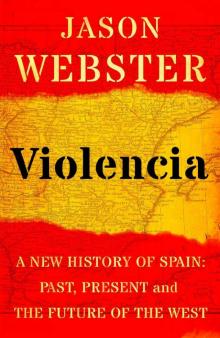 Violencia
Violencia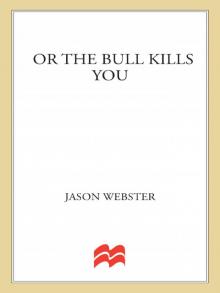 Or the Bull Kills You
Or the Bull Kills You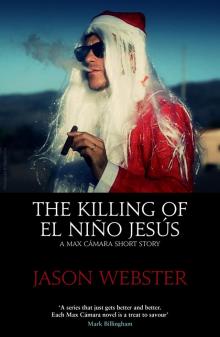 The Killing of El Niño Jesús
The Killing of El Niño Jesús The Spy with 29 Names
The Spy with 29 Names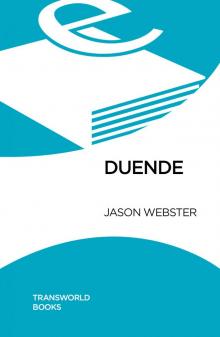 Duende
Duende Guerra
Guerra Sacred Sierra
Sacred Sierra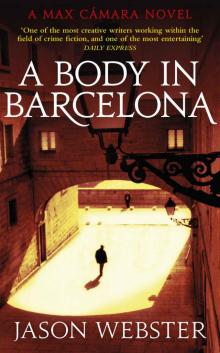 A Body in Barcelona: Max Cámara 5
A Body in Barcelona: Max Cámara 5 Fatal Sunset
Fatal Sunset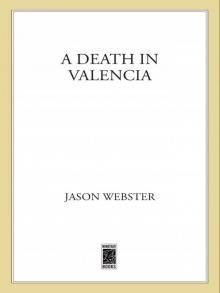 A Death in Valencia
A Death in Valencia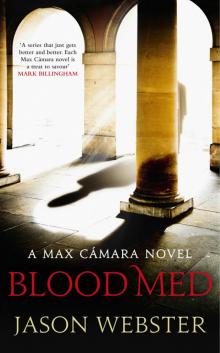 Blood Med
Blood Med Andalus
Andalus